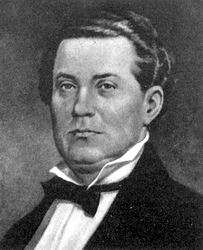Semen Hulak-Artemovsky

Semyon Stepanovych Gulak-Artemovsky (Ukrainian: Семен Степанович Гулак-Артемовський, also referred to as Semyon Gulak Artemovsky) (February 16 [O.S. February 4] 1813 – April 17 [O.S. April 5] 1873), was a Ukrainian opera composer, singer (baritone), actor, and dramatist who lived and worked in Imperial Russia.
He is known mainly for his comic opera Zaporozhets za Dunayem (A Zaporozhian (Cossack) Beyond the Danube), as well as for his dramatic talent and his powerful, rich baritone voice. He was the nephew of the poet Petro Hulak-Artemovsky and a close friend of Taras Shevchenko.
Biography
Semyon Gulak-Artemovsky was born in Horodyshche a city in present-day Ukraine (at the time a part of Imperial Russia) to the family of a priest, and went on to study at the Kiev Theological Seminary from 1835 to 1838. Having gained the attention of Mikhail Glinka, the young Semyon was brought to the capital of the empire, St Petersburg, in 1838 to receive vocal training directly from Glinka, as well as entry into the Imperial Chapel Choir. The following year, Gulak-Artemovsky left to continue his studies in Italy. Towards the end of his stay in that country, he began performing opera in Florence. Upon his return to St. Petersburg in 1842, Semyon Gulak-Artemovsky became a soloist of the Imperial Opera at the Imperial Bolshoi Kamenny Theatre, a position he held for 22 years. In 1852 and 1853 he sang roles in Anton Rubinstein's first two operas, Dmitry Donskoy and Fomka the Fool.
Gulak-Artemovsky performed at the Bolshoi Theatre in Moscow from 1864 to 1865. He performed over fifty operatic roles during his career, including Ruslan in Glinka's Ruslan and Lyudmila, Masetto in Mozart's Don Giovanni, as well as Antonio and Lord Ashton in Donizetti's Linda di Chamounix and Lucia di Lammermoor.
A composer of operas, as well as vocal and instrumental music, Semyon Gulak-Artemovsky composed his seminal work Zaporozhets za Dunayem in 1864, after completing the libretto in 1862.
His friendship with Taras Shevchenko began in the fall of 1838, after a chance meeting in St. Petersburg. The lifelong friendship continued during Shevchenko's incarceration and subsequent release, and was said to have strongly influenced Hulak-Artemovsky's view of the world. He dedicated his song A Maple Tree Stands Over The River (Ukrainian: Cтoïть явip нaд вoдoю, translit. Stoyit' yavir nad vodoyu) to Shevchenko.
Semyon Gulak-Artemovsky died at the age of 60 in Moscow.
Operas
- Ukrainian Wedding (Ukrainian: Українcькe Beciлля, translit. Ukrayins’ke vesillya, Russian: , translit. Ukrainskaya svad'ba) was first performed in 1851, with Semyon Gulak-Artemovsky in the role of the father-in-law.
- Ivan Kupala Eve (Ukrainian: Hiч нa Iвaнa Kyпaлa, translit. Nich na Ivana Kupala, Russian: , translit. Noch' nakanune Ivana Kupala) was first performed in 1852
- Zaporozhets za Dunayem (Ukrainian: Запорожець за Дунаєм, translated as A Zaporozhian (Cossack) Beyond the Danube, also referred to as Cossacks in Exile) was premiered April 26 [O.S. April 14] 1863 in St. Petersburg, with Semyon Gulak-Artemovsky in the role of Karas'.
External links
| Wikimedia Commons has media related to Semyon Gulak-Artemovsky. |
- Semyon Gulak-Artemovsky in the Encyclopedia of Ukraine
- As Semyon Artemovsky at IMDb
- Free scores by Semen Hulak-Artemovsky at the International Music Score Library Project
References
- Kaufman, Leonid (Лeoнiд Kayфмaн) (1962). С.С. Гулак-Артемовський (S.S. Hulak-Artemovsky), Art.